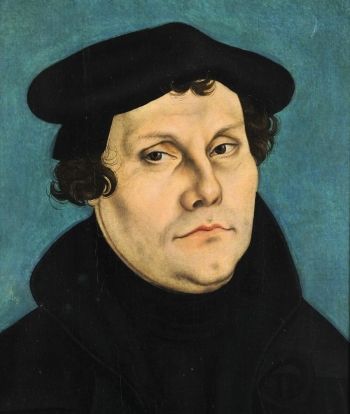A treasure waiting to be rediscovered

A treasure waiting to be rediscovered
31 October 2017
A 19th-century painting by Julius Hübner, which depicts Martin Luther posting his Theses.
Five hundred years ago, on the eve of All Saints’ Day, 31 October 1517, a 34-year-old Catholic Augustinian Monk named Martin Luther nailed his 95 Theses, which he had composed in Latin, to the door of the Castle Church in Wittenberg, Germany. 
A core thesis was number 62: “The true treasure of the Church is the most holy Gospel of the glory and grace of God.” Among the three major principles of the Reformation – Sola Gratia (unmerited grace), Sola Scriptura (pure scripture), Sola Fide (faith alone) – Sola Scriptura was a core Reformation principle.
Almost 2500 years ago, Ezra, the Jewish priest and scholar of the law of Moses, arrived in Jerusalem from exile in Babylon. The people of Israel, many of whom had also returned from exile in Babylon, assembled on the Temple Mount and asked Ezra to get the sacred Torah – The Book of the Law of Moses.
Ezra stood on a wooden platform built for the occasion, and read the Scriptures from early morning till noon, with the people listening attentively. As Ezra read, the attending Levites moved among the people, providing an oral translation and explaining the Scriptures so that the people could understand it (Nehemiah 8:1-11).
About 2000 years ago, Paul, the aged apostle, in writing to his young colleague in the ministry, Timothy, said: “... keep safeguard, the treasure put in our charge” (1 Timothy 6.20, 2 Timothy 1:12-14). Then 200 years ago, on 7 March 1817, the NSW Auxiliary of the British and Foreign Bible Society was founded in Sydney, in the Colony of NSW.
Through the ensuing years, the Bible throughout our nation was widely viewed as the bread of life and essential for spiritual sustenance.
Translations for the people
One of the major aims of the Reformed Church in the English and European Reformation was the placing of the Scriptures into the hands of the people, as Ezra did, and causing it to be understood by their minds.
To this end, Martin Luther, in 1521 in Wartburg Castle, commenced his translation of the Bible into his mother tongue so that the ordinary people could read the Word of God.
It is considered that this work was Luther’s noblest achievement. 
While Luther was working on his translation, the English scholar, William Tyndale, bequeathed the English the first translation of the New Testament in their own language (1515-1526).
Tyndale on one occasion told a Catholic priest: “If God spares my life before many years pass, I will cause a boy that drives a plough to know more of the Scriptures than you.”
By the time of Tyndale’s martyrdom in 1536, thou - sands of his New Testament translation had been printed and dispersed throughout England. Truly, “they cannot chain the Word of God” (2 Timothy 2:9 J.B Phillips translation).
As witnessed in the time of Ezra, the Early Church, the English and European reformations, the founding of the Bible Society in Australia, wherever people have discovered, rediscovered and taken God’s Word seriously, there has been a reformation of personal lives, the Church and, indeed, society.
What would such a reformation of God’s Word in 2017 have by way of an impact for us as Christians, for The Salvation Army and our nation?
St Jerome (342–420AD), whose greatest achievement was the translation of the Bible into Latin from the original languages, wrote: “Christ is the power of God and the wisdom of God, and if the one who does not know Scripture does not know the power and wisdom of God, then ignorance of Scripture is ignorance of Christ.”
The Lutheran pastor, Dietrich Bonhoeffer, writing from his Gestapo prison cell in 1944, just six months before his martyrdom at the age of 39, said: “We must persevere in quiet meditation on the life, sayings, deeds, sufferings and death of Jesus.”
As disciples of Christ, we must steep our minds in the gospel narrative, the sayings and teachings of the four gospels, until the very figure of our Lord stands before us in the full colours of life, and then turn to the letters of the apostle Paul to teach us what that life and ministry meant for him and for us in 2017.
But be warned! Martin Luther discovered that wherever the Gospel, the Word of God, was preached and taught, the Devil was always there, for as Luther experienced, the evil one will not tolerate the discovery and rediscovery of the Gospel, and will seek to destroy it and those committed to Jesus and the Word of God.
However, be absolutely assured, “... the reason the Son of God appeared was to destroy the Devil’s work” (1 John 3:8).
Let me finish with a prayer by B.F Westcott, the 19th-century Anglican Bible scholar and Bishop of Durham, England:
“Blessed Lord, by whose providence all Holy Scriptures were written and preserved for our instruction, give us grace to study them this and every day, with patience and love. Strengthen our souls with the fullness of their divine teaching. Keep from us all pride and irreverence. Guide us in the deep things of thy heavenly wisdom, and of thy great mercy lead us by thy Word unto everlasting life, through Jesus Christ our Lord and Saviour. Amen.”
Lieut-Colonel Douglas Clarke is a retired Salvation Army officer and author of several books.
Read about the first-ever Salvation Army Europe Zone theological symposium which recently took place in Wittenberg.
Comments
No comments yet - be the first.